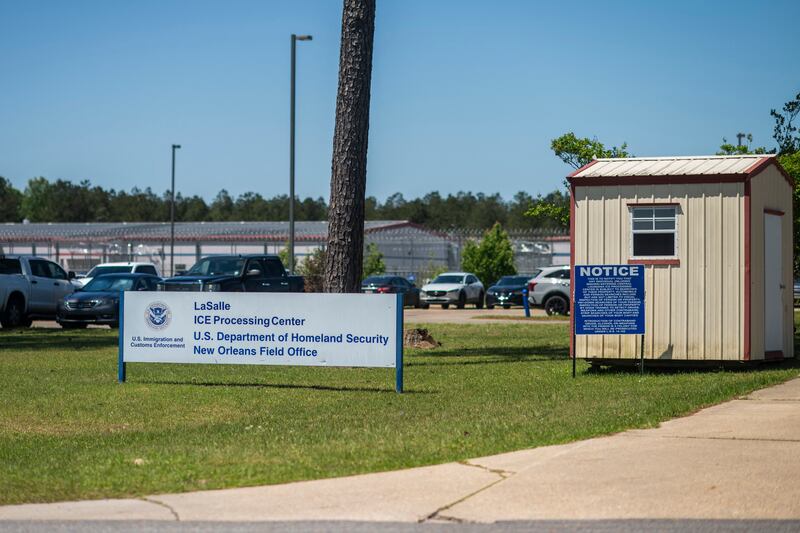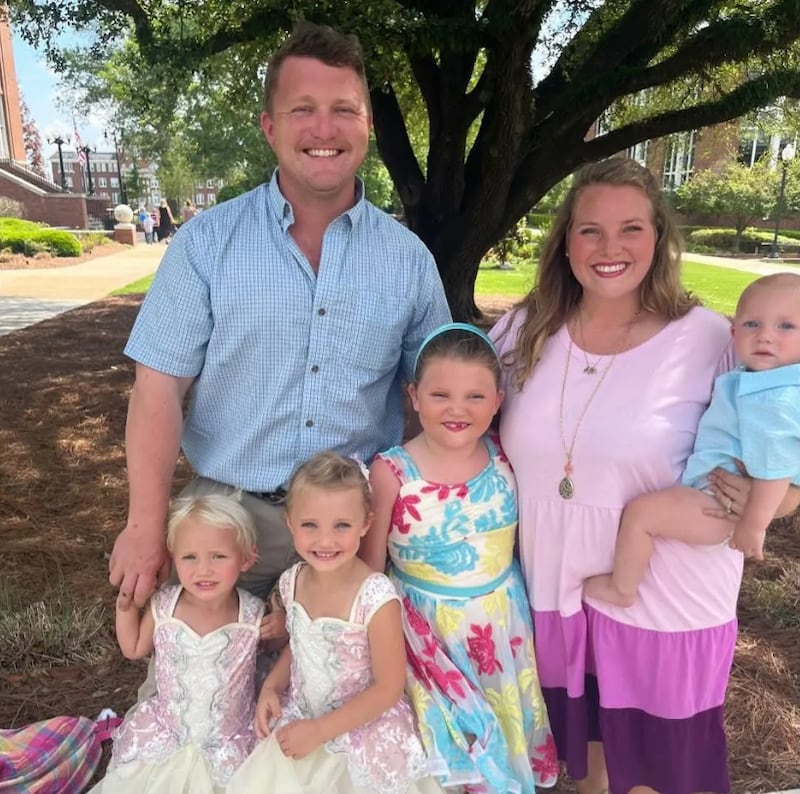The Danish dad of four detained at his interview to become a U.S. citizen has spent the last month in an ICE facility infamous for reports of a cockroach-filled kitchen and abuse by its guards.
Kasper Juul Eriksen, 32, was arrested in Memphis, Tennessee, last month because he missed a paperwork deadline a decade ago. His wife was left to drive three hours back to their Mississippi home alone, while he was taken to the Central Louisiana ICE Processing Center in Jena, Louisiana, about 140 miles northwest of Baton Rouge.
An immigration attorney told the Daily Beast on Thursday that the rural facility is infamous even by ICE’s standards, with its location making it ideal for holding migrants whom the agency wants to keep visitors from. Columbia University student Mahmoud Khalil, who has been detained since March for organizing demonstrations regarding the Israeli-Hamas war, is also being held there.
Known as CLIPC for short, it is a for-profit facility that the GEO Group operates. It was a juvenile correctional center in the 1990s, but was shut down after reports of children being beaten, tear-gassed, and pepper-sprayed emerged.
GEO reopened the facility in 2008 to jail migrants on behalf of ICE. Complaints of abuse and “inhumane” conditions followed, according to a Robert F. Kennedy Human Rights report published in August.
That report featured allegations by a detainee named Alex, who filed multiple grievances related to forced labor practices, medical neglect, and contamination of the food they were served.
“A woman at CLIPC working in the kitchen discovered rat feces covering food bags and bread in the kitchen,” the report said. “Officials forced her to serve the food after brushing aside the excrement.”

Whistleblowers also claimed the facility ranks detainees by “risk level,” with those deemed less risky in yellow and most risky in red.
Those colors can reportedly change in a snap, however. One detainee alleged they were bumped from orange to the dreaded red jumpsuit “after a verbal disagreement with an officer” over law library access. It is unknown what Eriksen’s risk level is considered, but he has no criminal record.
Conditions have been described as uncomfortable to downright deadly. In 2016, three migrants in custody died before July 1. The Department of Homeland Security’s Office for Civil Rights and Civil Liberties investigated and determined that an improper medical response was a contributor to the deaths.
The following year, the detention center ranked in the top five of U.S. immigrant jails for the number of sexual assault complaints it received. The Kennedy nonprofit said these issues are compounded by staffing issues, as there is just one guard for every 230 detained people.

Even basic liberties are often denied, detainees allege. That included the reported denial of access to toothbrushes and tampons, as well as claims that guards gave detainees used razor blades and forced a man in solitary confinement to spend three months without clean laundry or bedding.
“People treat their dogs better than how this jail treats us,” a detainee named Daniel told the nonprofit. “There is no respect for human life. No humanity. It is impossible for me to get the right treatment for my diabetes here. Every day, I fear for my life. At CLIPC, ‘PC’ stands for ‘punishment custody,’ not ‘protective custody.’”
The GEO Group told the Daily Beast in a statement that it provides “around-the-clock access to medical care, in-person and virtual legal and family visitation, general and legal library access, dietitian-approved meals and specialty diets, and recreational amenities.”
The organization added, “We are proud of the role our company has played for 40 years to support the law enforcement mission of U.S. Immigration and Customs Enforcement.”
Eriksen has been in ICE custody since he arrived at his citizenship interview after living in Mississippi for over a decade. He works as a welder and first came to America as a foreign exchange student in high school.
Eriksen’s wife, Jennifer, told the Mississippi Free Press that he was detained because he did not submit Form I-751, otherwise known as “Petition to Remove Conditions on Residence,” by a deadline in 2015. The deadline came and went as the family was grappling with the fallout of her suffering a stillbirth with their first child, she said.
Sarah F. Rogerson, a professor at Albany Law School in New York, told the Daily Beast that Eriksen’s missing form was a serious one in the naturalization process.
“Unfortunately, certain forms in immigration carry a lot more weight than what a reasonable person would perceive as mere paperwork,” she said. “Something like a missed filing deadline for a Form I-751, though it seems like a harmless error, could result in a determination by immigration authorities that a person has abandoned their entire application for residency and therefore, no longer wish to naturalize. It can also sometimes result in the government unilaterally terminating the individual’s application for failure to timely file.”

Eriksen has a court date scheduled for May 27 to determine whether he can be released on bail, according to a GoFundMe run by Savannah. Rogerson said whether he gets out will largely depend on the judge he is assigned to.
At best, Rogerson says he could be released on bail and continue pursuing citizenship. At worst, he could be placed in removal proceedings that could take years to play out.
“The next few days and weeks are extremely important,” she said. “It’s a terrifying story that immigrant families face every time they report to ICE officials, even when they think that their paperwork is in order, and even when the delay is not on their end, but a result of government error.”
The post Inside the Cockroach-Filled ICE Facility Where Trump’s Goons Tossed Danish Dad of 4 appeared first on The Daily Beast.




